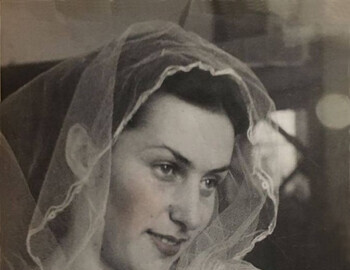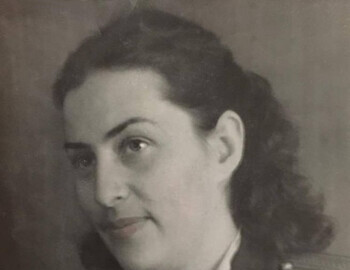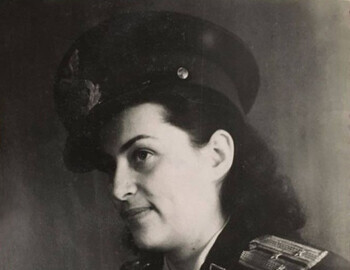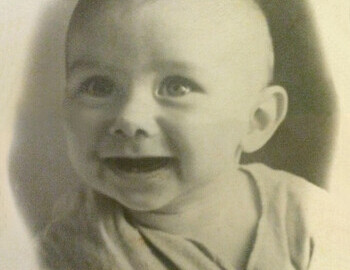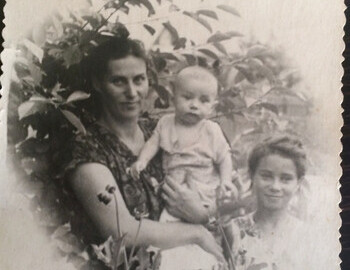Tried for bribery and traitor brother
New documents found about the most mysterious member of the Dyatlov group
All rights belong to Komsomolskaya Pravda. Authors Nikolay Varsegov %u0438 Natalya Vatsegova
Text in Russain
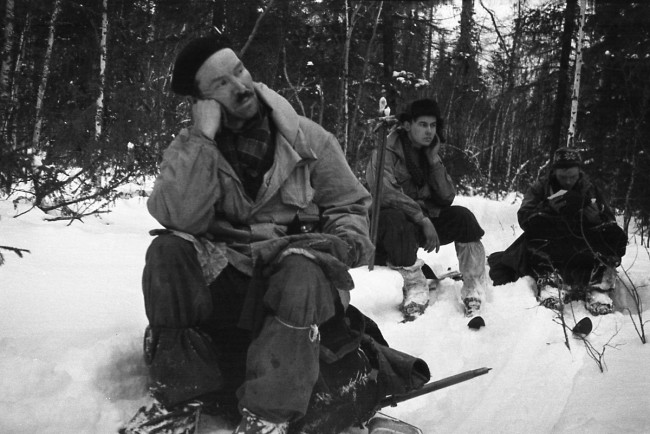
It is known that the most mysterious member of the Dyatlov group was the 37-year-old combatant Semyon Zolotaryov.
In the winter of 1959, nine hikers-skiers disappeared in the mountains of the Northern Urals. They were participating in a trek led by Igor Dyatlov. A month later, rescuers found their tent cut open. Within a radius of one and a half kilometers from it they found five frozen bodies. The rest of the group were found only in May. Almost all the hikers were barefoot and half-naked. Some have fatal injuries. It is still not clear why the guys fled to the bitter frost and to their death.
It is known that the most mysterious figure in the Dyatlov group was the 37-year-old combatant Semyon Zolotaryov. After the war he graduated from the Minsk Institute of Physical Education and went to the secret and closed city of Lermontov. He got a job as a physical training teacher. People who knew Semyon said that he, being a communist, was not an example of morality for a Soviet person and that he had a unruly character. He committed misconduct for which someone else would have been both expelled from the party and fired from his teaching position. But for some reason Semyon Zolotaryov got away with it. Some researchers of the tragedy of the Dyatlov group believe that Zolotarev could have been an unofficial employee of the security agencies. And even that he went with a secret mission on that fateful expedition.
Recently we managed to get an interesting document - the minutes of a closed party meeting, at which the moral character of Semyon Zolotaryov is once again examined. And in this document the life and character of our protagonist are reflected quite vividly. The atmosphere of those years is also interestingly shown here: theft at various levels and the leading role of the Communist Party in educating its members who have tripped.
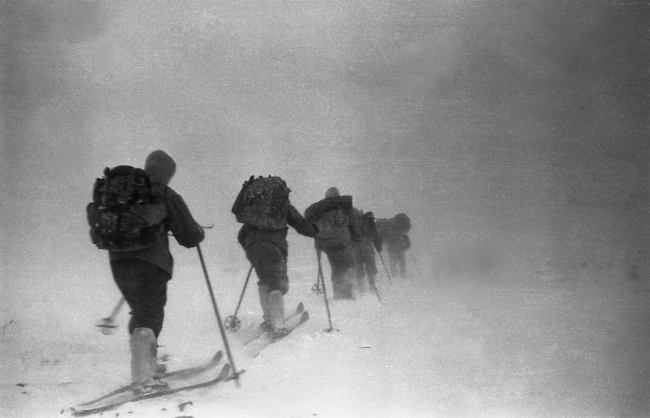
Some researchers of the tragedy of the Dyatlov group believe that Zolotarev could have been an unofficial employee of the security agencies. And even that he went with a secret mission on that fateful expedition.
Here is the full document, including our comments.
Extract from the minutes of a closed party meeting of the primary party organization at secondary school %u2116 18 dated May 9, 1955.
Agenda:
Personal file of Comrade Zolotaryov, member of the CPSU.
Listened to:
1. Comrade Zhidkov%u0430, who reported that during the distribution of apartments, Zolotaryov's wife, Comrade Burgach, had bribed the head of the Housing and Communal Department. If earlier Comrade Zolotaryov denied his involvement in this case, now he does not deny that the bribe was given with his consent. It must be assumed that Zolotaryov is an accomplice in the bribing.
Investigating this issue, the Civil Code of the CPSU established that for 4 years Zolotaryov lived with his aunt at her expense, hiding his salary, treated her very rudely, even beat her (there is a medical record). Then he moved to live with Burgach, where he also continued to behave rudely and hid his salary to save money.
Zolotaryov's gravest crime is that he concealed from the party the betrayal of his brother during the Nazi occupation and that his brother was shot as a traitor to his homeland.
2. Zolotaryov. He said that the first time at the meeting, he behaved poorly, denying involvement in the bribery. He said that it is his fault that he did not convince Burgach against it. In reference to his aunt, it was important that she deceived him, saying that she was buying food at the market while she was stealing from the sanatorium where she worked. He started saving money while still a student. In relations with his aunt, he was rude, because his nerves could not stand it. And the beating in question happened by accident. Here, too, he admits his guilt. As for the concealment of his brother's betrayal, at first he did not know about it, and then he believed that everyone is responsible for himself. He is fully responsible. It is his fault. He admits his mistakes, Zolotaryov assured the party organization that he had corrected all the mistakes, he would work honestly, and asks to remain in the ranks of the party.
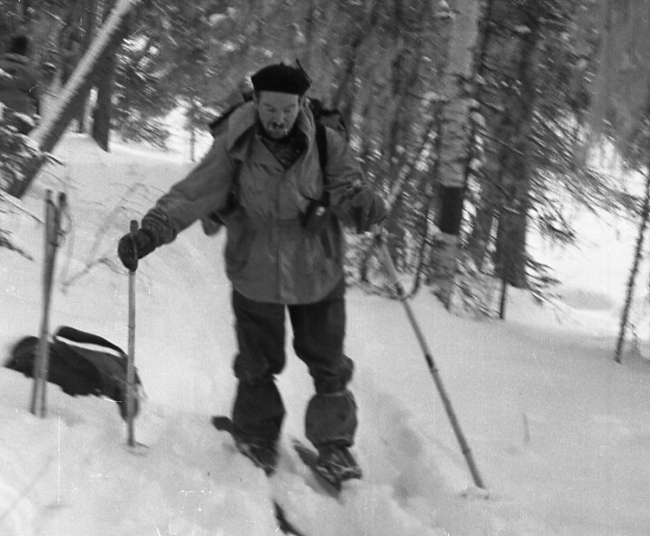
People who knew Semyon said that he, being a communist, was not an example of morality for a Soviet person and that he had a unruly character.
From the authors:
Little is known about Semyon's brother Nikolay. He was born in 1903, in 1941 he went to the front. But soon after being wounded he returned home to the Kuban. And after the occupation of the Kuban by the Germans, he went to their service. Already in 1943 he was arrested and convicted of treason. The verdict is execution. The family never found out where his remains were buried.
But what is curious is that in the closed city of Lermontov in the 1950s, in the conditions of the strictest secrecy, uranium was mined. And any newcomer was carefully checked by the state security authorities. The relatives of the visitor were also investigated. But they missed a man whose brother is a traitor! How could this happen? Or Semyon had a serious trump card, which, even after being exposed with his brother's betrayal, gave him the right to stay in the city?
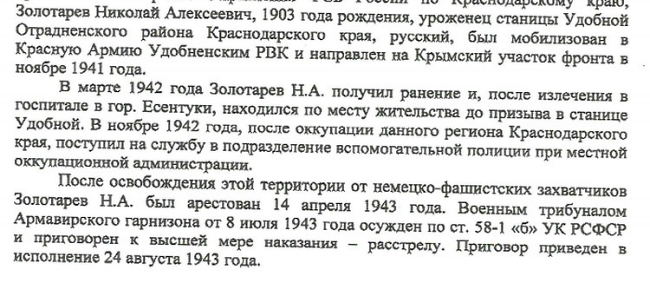
Little is known about Semyon's brother Nikolay
Nikolay Alekseevich Zolotaryov, born in 1903, native of the village of Udobnoy, Otradnensky district of Krasnodar Territory, Russian. He was mobilized into the Red Army by the Udobnoy Military commissariat and sent to the Crimean sector of the front in November 1941.
In March 1942, N.A. Zolotaryov was wounded and treated in a hospital in the city of Esentuki. He went to live back in the village of Udobnoy. In November 1942, after the occupation of this region of the Krasnodar Territory, he joined the auxiliary police unit under the local occupation administration.
After the liberation of this territory from the Nazi invaders, N.A. Zolotaryov N.A. was arrested on April 14, 1943. The military tribunal of the Armavir garrison of July 8, 1943 convicted him under Art. 58-1 "b" of the Criminal Code of the RSFSR and sentenced to capital punishment - execution. The verdict was carried out on August 24, 1943.
Questions:
When you were elected secretary of the party organization, did you tell your biography?
Answer: No, I didn't.
Why didn't you register your marriage with Burgach?
Answer: She has no divorce from her first husband.
Who are your parents and where do they live?
Answer: Father is a medical assistant, mother is a housewife, they live near Cherkessk.
What did you talk with Burgach in regards to the bribe?
Answer: At first I agreed, and then I was against.
Did you live in the same apartment with Burgach until recently?
Answer: Yes.
How do your parents live and how do you help them?
Answer: My father receives a pension, I send groceries, I help with the household on vacation.
How much are you paid monthly?
Answer: 1200 rubles.
For what purpose did you save money?
Answer: The deposit is confidential.
What kind of troops did you serve during the war and did you have any awards?
Answer: Served in the engineering troops, was awarded the Order of the Red Star and three medals.
How do you feel about your brother's betrayal?
Answer: Blocked him from my memory as a traitor.
From the authors:
Semyon Zolotaryov's salary of 1,200 rubles in 1955 is not a bad salary, considering that the national average salary was 711 rubles. The salary of a teacher was 742 rubles. The maximum salary was for water transport workers - 906 rubles. The minimum for collective farmers is 458 rubles, food and transportation industry workers - 449 rubles.
A kilogram (2 lbs) of white bread cost 3 rubles, rye 1 ruble, a kilo of beef 12 rubles 50 kopecks, a liter of milk 2 rubles 24 kopecks, butter 27 rubles 80 kopecks.
A bottle of vodka 22 rubles 80 kopecks. Red caviar 36 rubles per kilo, black caviar 85 rubles.
The most expensive suit was 1,500 rubles.
Why Zolotaryov, who has nothing to do with uranium mining, has this salary remains unclear.
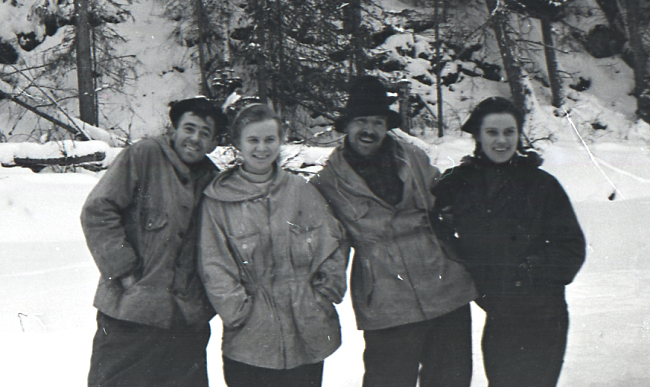
In fact the role of the combatant Semyon Alekseevich in the fateful expedition could have become fatal.
Listened to:
T. Zhidkova, who drew the attention of party members to Zolotaryov's character trait - greed. Hence all the consequences that we are discussing today. The second trait is insincerity. Even his last written explanation is more sincere than what he said here. This is the reason he didn't tell about his brother. We are discussing today an ugly manifestation in the party. We need to think about whether Zolotaryov's behavior is compatible with the title of a party member.
Comrade Zolotaryov. His brother lived separately from the family, so nothing can be said about his upbringing. I saved up money to buy a house or apartment. He thought of all his actions and considers his behavior to be wrong.
T. Peskov, who immediately upon arrival at school had dealings with Zolotaryov about party work, which is not yet up to the party standards. Zolotaryov was distracted from the work. At the last meeting, Zolotaryov's behaviour was innapropriate, denied everything. This suggests that Zolotaryov fell to the lowest level of human hypocrisy. The facts forced him to come clean. The fault of the party organization is that Zolotaryov's behavior has not yet been recognized at the meeting. Considering his combat merits and the fact that he admitted his mistakes, he proposes to give Zolotaryov a severe reprimand with a final warning and an entry into his personal file.
T. Krikunov (the school director), who said that Zolotaryov's relationship with his family was known to him. But the most important thing is that Zolotaryov hid his brother's betrayal. As for work, last year he worked much better, then somehow he began to behave more carelessly. But now, after the inspection, Zolotaryov began to work better. Taking into account the latest decisions of the Central Committee of the party on the sensitivity of the approach to party members, and on the educational value of decisions, relying on the party charter, he proposes to issue a severe reprimand to Zolotaryov with a final warning and an entry into his personal file.
T. Polievktov says that silence after the instructor's message is not just silence. It is very difficult to talk about the behavior of the secretary after we have discussed personal matters. By asking questions, we tried to find out the morale of Zolotaryov. Apparently, he has good inclinations, but he suppressed them within with his greed. He agrees with the proposal of his comrades. It is necessary to re-educate a person, direct him to the right path. The spirit of a person born under Soviet rule should help him rebuild his behavior.
Proposals received:
Consider that Comrade Zolotaryov deserves expulsion from the party for all the above facts.
Given his participation in the Great Patriotic War, government awards, based on the party charter, we concider:
1. For dishonest behavior, expressed in complicity in giving a bribe, in the wrong attitude towards relatives and in hiding from the party the fact of his brother's betrayal during the period of fascist occupation, to give S.A. Zolotaryov a severe reprimand with a final warning and an entry into the personal file.
2. Release Comrade Zolotaryoev from the post of secretary of the party organization as having compromised himself.
Listened to:
Comrade Zolotaryov, who asked to leave him on the post of secretary of the party organization, since he would like to improve on this post.
Comrade Zhidkova, who said that Zolotaryov, apparently, did not understand that the communists are doing condescension to his good past and want to re-educate him. So he should not be left as secretary.
The party meeting decides:
1. Give Comrade S.A. Zolotaryov a severe reprimand with a final warning and with entry into a personal file for dishonest behavior, expressed in complicity in giving a bribe, wrong attitude towards relatives and hiding from the party the fact of his brother's betrayal during the Nazi occupation.
2. Release Comrade S.A. Zolotaryov from the duties of the secretary of the party organization.
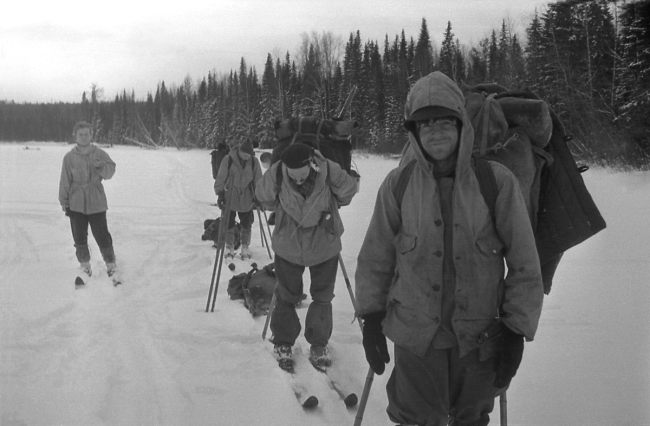
In the winter of 1959, nine hikers-skiers disappeared in the mountains of the Northern Urals. They were participating in a trek led by Igor Dyatlov.
From the authors:
We are often asked why we are so closely studying the biography of Semyon Zolotaryov, because his personal life is essentially not related to the tragedy in 1959. We think that in fact the role of the combatant Semyon Alekseevich in the fateful expedition could have become fatal. His character was a difficult one, hot-tempered and unruly. We do not exclude that a confrontation between the leader of the trek and its most senior participant could have led to the tragic events.
Tamara Burgach
